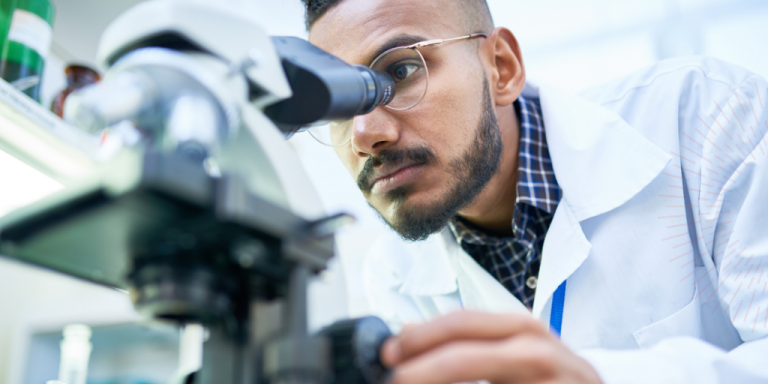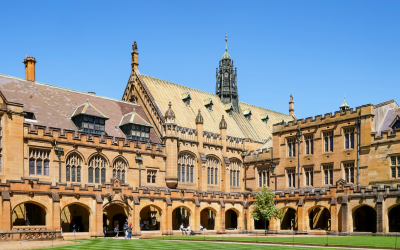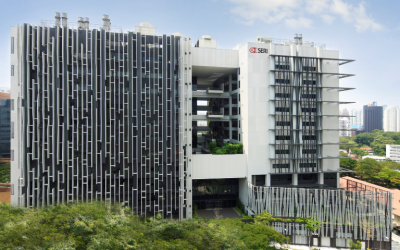Research Pathways in Advanced Therapeutics (with Practice) MSc

This programme is intended to develop practical skills and strategies for shaping research practice for identifying science based solutions and innovations, and shaping opportunities for these to be developed and actualised in lab based and real world contexts.
It should be noted that while the programme is located within the UCL Institute of Ophthalmology, there is no assumption that only students with an interest in this area should apply. The core learning is not subject specific.
The programme will utilise the expertise available at the IoO given that the staff are mainly translational researchers across the life sciences and contains a placement with global partner institutions.
The programme is also predicated on you being able shape your own area of interest from a suite of optional modules delivered by other UCL departments. The UCL/IoO location allows for students to place their learning on this programme in a context that explicitly consolidates research into translational practice and implementation.
The extended period of study (20 months) provides you with an intensive taught curriculum, which then feeds into periods of independent research activity, ensuring that you will leave with a substantial lab based skills and research portfolio, maximising your capacity to develop your practice further through PhD study/Institutional research or in workplace Laboratory contexts.
The blended structure of compulsory and optional modules allows a substantial base of key skills, knowledge and understanding to be developed intensively, while also allowing specialist lines of enquiry to develop in respect to shaping individual areas of research. The diet of the optional modules from across UCL departments ensures a genuine translational approach is embedded and provides a focus on research driven identification of therapeutic problems to solve, through the range of current and emerging treatment innovations.
The programme is also predicated on you being able shape your own area of interest from a suite of optional modules delivered by other UCL departments. The UCL/IoO location allows for students to place their learning on this programme in a context that explicitly consolidates research into translational practice and implementation.
- Teaching and Learning Methods
Module Teaching is primarily in the form of attended lectures and seminars across terms 1 and 2, in module teaching. Face to Face attended sessions form typically approx 18-20 hours per week in terms 1 and 2 and there is considerable independent reading and study expected through the module delivery period and in the periods of independent research.
Lectures allow for specific, in depth information to be provided;
Seminars allow for interrogation and discussions of material covered to develop understanding
Group tutorials allow for more detailed appraisal of the learning journey and further consideration of the material covered in lectures and seminars
Lab time and guided practical sessions allow for you to evolve hands on technical skills, facility and processes for lab based research activity
Module consolidation seminars involving problem or case based presentations relating to module content and informal quizzes allow for knowledge and understanding to be tested, and for formative feedback to be given , in advance of summative assessment, alongside focused revision sessions
Research in practice seminars allow for investigative, analytical, synthesis and data interrogation skills to be developed, prior to being put into practice in the dissertation module. A considerable number of student-led journal club sessions will develop the crucial skills of scientific scrutiny, peer-reviewing and abstract writing.
Digital learning/VLE you can expect to engage in some online activities to support independent study, which may include guided learning activities (online quizzes), attendance on digital platforms for tutorials, discussion and presentations; review video material such as lectures to consolidate understanding and supply written tasks via digital methods such as e-portfolios, and Turnitin. From time to time you can expect to engage with digital/online learning within taught modules in year one such as video seminars, lectures and presentations. All Module guidance, tutorials and dissertation supervision in year two will be conducted via online/distance methods while you are on placement.
Independent research and reflection forms a substantial proportion of the study hours, encompassing time spent preparing for taught module sessions and assessments, and planning, shaping and conducting the research for your projects, which may include self led lab time as well as library based research. You will systematically gather and analyse research data to draw conclusions, with the assistance of academic supervisors.
Terms 3 encompasses the first research project based module which is fundamentally reliant on you learning autonomously, but with academic supervision and pastoral support throughout.
The study in Year 2 (terms 4 and 5) will be supervised while you are in an external Lab placement intended to develop further your independent practice and bench skills in a lab context. The three modules studied alongside the placement intersect with your ongoing learning, practical skills and research activity, and ask you to shape, evaluate, implement and conclude in respect of these in the assessment tasks. You will remain under the supervision of your IoO tutor throughout for academic and pastoral guidance, through regular online tutorials and seminar sessions. All 3 modules are intended to demonstrate your capacity to engage with substantial independent learning and self directed study.
Some variation of learning and teaching strategies will result from the optional modules selected.- Employability
Graduates from this programme will gain;
- A systematic understanding of research and therapeutics, and a critical awareness of current problems and new insights informed by current research and practice at the forefront of the field
- A comprehensive understanding of the techniques and processes which drive both research practice and the therapies themselves
- A capacity to apply and generate new knowledge through their own research, with a practical integration of established techniques of research and enquiry in this area, and the potential to innovate new models for research in practice
- The capacity to critically appraise existing research, methodologies and processes for developing therapies
- The ability to formulate and evaluate complex decisions, solutions and communications of their findings
- The autonomy to initiate, plan and actualise effective research projects independently
- The potential to advance their learning and skillset, and to undertake further research and practice in both subsequent study and employment
- Effective written and verbal communication skills, which support information and data management
- A substantial individual research portfolio, based on lab practice and experience
- Programme Structure
- Study moves from compulsory taught modules in term one with a core skills and knowledge focus, to a diet of taught options in term two which allow you to construct your learning according to your evolving areas of research interest. This research interest is then focused and interrogated through a research project based module in term 3 which will expand lab-based skills.
In terms 4 and 5 there will be a more extensive Lab placement either at UCL IoO or with an international partner institution which will provide additional lab expertise within an academic environment and foster academic collaboration. There will be a preliminary module focused on preparing a grant funding application around the proposed project, allowing a thorough understanding of the background science and implementation of grant writing skills taught in year 1, and a reflective module which will ask you to appraise and evidence your practical bench and lab skills . The research project itself will be conducted in term 5.
The primary location of study at UCL’s IoO, provides a distinctive environment in which to learn. The institute’s record in innovating therapies through research to implementation is longstanding and globally recognised. The collaborative relationship between the institute and Moorfields Eye Hospital not only provides a coherent microcosm of the direct application of research into clinical use, it also affords a particular insight into bench to bedside research in practice. IoO’s relationships with global partner institutions afford you direct experience of how research in this field is not only translational in application, but transnational in its engagement with global health challenges and solutions.
The Research Dissertation Project, which forms the final assessment, develops your independent practice substantially; working from the science based identification of need into shaping, realising and reporting your research that could inform therapeutic innovations in the future that might transform treatments and lives in the context of a global society. - Modules
TERM 1 – ALL COMPULSORY
Research in Practice (15 Credits)
Science of Diseases (15 Credits)
Stem Cells and Eye Repair (15 Credits)
In Vivo models in Research (15 Credits)TERM 2- ALL OPTIONAL- STUDENTS SELECT 4 (or 3 if Pharmacology of Inflammation (Extended) is chosen)
Advanced Clinical Pharmacology and Therapeutics (15 Credits)
Clinical Pharmacology and Therapeutics (15 Credits)
Immunodeficiency and Therapeutics (15 Credits)
Pharmacogenomics, Adverse Drug Reactions and Biomarkers (15 Credits)
Novel Therapies: From Concept to Clinical Translation (15 Credits)
Molecular Aspects of cell and gene therapy (15 Credits)
Pharmacology of Inflammation (15 Credits)
Pharmacology of Inflammation (Extended) (30 Credits)TERM 3 - COMPULSORY
Research Project and Lab Skills (60 Credits)TERM 4 - COMPULSORY
Grant application proposal (30 Credits)
Reflective Evaluation AND e-Portfolio (30 Credits)TERM 5 & 6 – COMPULSORY
Lab based Research Project DISSERTATION (60 Credits)
These placements will ideally be overseas to give the you the once-in-a-lifetime experience of working in a different research environment and to foster long term collaborations and potential career opportunities for the future.
We have partnered with three prestigious research centres around the world who will host students, these are;- Univeristy of Sydney, Australia
- SERI, Singapore
The lab work will be supervised locally but the overall project dissertation will be supervised by UCL to ensure parity across the different labs.
- Assessments
Written exams – testing knowledge, and applying knowledge and understanding to case study/scenario analysis
Coursework essays – organisation of knowledge and understanding in order to develop cohesive argument
Written reports – demonstrating skills of reflection, evaluation, interpretation and conclusion
Coursework Portfolio– arrangement of short form written analyses of practice, skills, research, needs, case, scenario, product and/or data sources, demonstrating breadth of engagement and understanding of principles
Presentations – selection, synthesis and communication of information for varied audience/ purpose, media (oral/poster etc), precis/concision, including both group and individual projects. These may be online or in person
Abstract /Grant Proposal writing- shaping theses and research into coherent summaries that demonstrate aim and purpose of research, convincing and evidenced argument and integrated contextual understanding of audience and objectives
Independent research projects/dissertations – creating/modelling science based hypotheses and research design, interrogating current practice, literature reviews, practical analysis of planning, implementation, evaluation of results and conclusions.
Research presentation and panel questions VIVA- communication, information, targeted, persuasive, professional interrogation of knowledge and understanding as demonstrated, capacity to take knowledge to new scenarios
Reflective evaluation – appraisal of personal practice and experience, evaluate projects and outcomes, identify personal learning objectives
Some variation of assessment tasks will result from the optional modules selected.

University of Sydney, Australia
(Collaborating institution for lab placement)

SERI, Singapore
(Collaborating institution for lab placement)
Apply Now
Further information
Start date:
September 2021
Duration:
2 years
Get in touch with us
Admissions
ioo.admissions@ucl.ac.uk
 Close
Close

